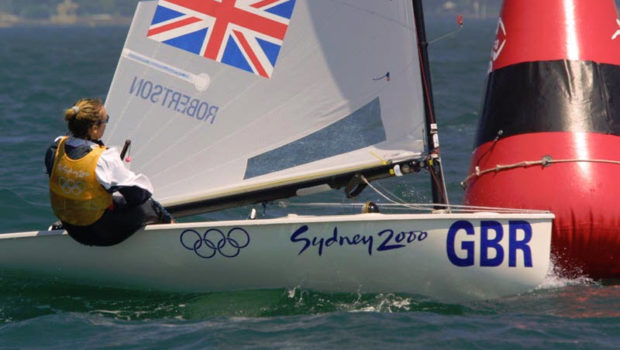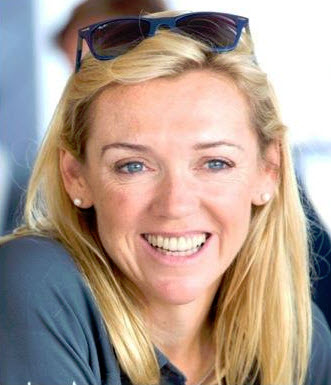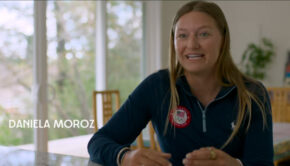Shirley Robertson: Before the Gold Medals
Published on July 18th, 2016
Shirley Robertson made it into the history books by becoming the first British woman to win two Olympic gold medals at consecutive games, Sydney 2000 and Athens 2004. At the Rio Games, Shirley will be working with the BBC to deliver the sailing news back to the kingdom, and here chats with Scuttlebutt editor Craig Leweck about the Olympics…
You’ve been to four Games, with Barcelona in 1992 as the first. What do you remember from that Olympics?
Oh, goodness. I was so very wide-eyed. I didn’t really understand quite what it was all about. I just found myself there, and in hindsight, a bit unprepared. I was just 24, which by now is quite old, but at that time it was a different kind of model. People went to college first and then thought about it, so it’s a different world now.
You finished 9th in the singlehanded Europe.
One of my lasting memories is the medal ceremony, not being in it, watching it, watching the Americans and the Spanish win all the medals. It was then, I suppose, when I realized what it was all about and how this is what I wanted to do. I had a moment of clarity at the Olympics watching other people.
The sailing venue was part of the city.
We were right in it. I could see my boat from my bedroom in the village, so it was quite something actually, to be able to go to lots of stuff and to see all and to live in the village with all the athletes and all of the usual, but it was a good Games.
And now you were all in for another quad. Next stop Atlanta 1996.
I literally stepped off the plane from Barcelona and stepped into wanting to make it happen. There was no down period. I absolutely dove in with limited budget, but I did everything. I developed equipment and trained hard. I had training partners, coaches. I did what I thought was right, but obviously with hindsight again, there were some errors in my decision-making and finished fourth in the Europe event.
What kind of errors?
I put too much pressure on myself. During those four years I didn’t do anything else. I never went to the cinema or out with friends. You’d find me in the evening in my garage on my stationary bike. It was just all way, way too serious. I suppose I had no one really to keep me in check. I would practice my strengths and not necessarily address my issues.
When the Games started I was really nervous. I came up to the start line of the first race and my back leg was shaking so much, I couldn’t really properly hike out. In the first Olympics I was really wide-eyed and young and the next one I really thought I could medal and didn’t, so yeah, it was a hard winter after that.
Hard in what way?
It was Olympic depression. It was at a time when there was no funding. On a daily basis you were taking pretty harsh reality checks about how you were spending money and what you were doing with your life. I think it’s certainly different now in many countries. There’s an element of subsistence at least, but you’re applying your own further with that.
How did the sailing venue compare to Barcelona?
It was a very different Olympics. The sailing venue was far removed from Atlanta. We were miles out in Savannah and even miles out from Savannah. We were seven miles from the town to this man-made island. It was a very different experience. I didn’t really feel part of the Olympics, but went with lots of expectation, and then was devastated when I finished fourth.
Explain how it was a different experience.
For starters it was hard to train. I suppose I was one of those perfectionists. I like to train a lot at the venue, I like to train more than anyone else and I like to work harder than anyone else. That was the way I rolled and it was hard to do that there. Literally, we were seven miles out from the city. I always wanted to go, but logistically it was just so difficult and every day there was thunderstorms, so your day was cut short. Then there were these bloody gnats everywhere. It was quite something.
But as you do when you’re an Olympic sailor, you deal with what’s thrown at you as they are in 2016. They’re just dealing with it and it’s the same for everyone; everybody had the gnats. And it wasn’t all bad memories. Parts of it were quite special, like sailing amid the dolphins. But it is pretty hard to underperform. I suppose now, with the element of hindsight, you look back and it was a real turning point in my career. I suddenly realized how not to do that, I suppose.
Parts 2 and 3 of this conversation with Shirley will be linked here.










 We’ll keep your information safe.
We’ll keep your information safe.